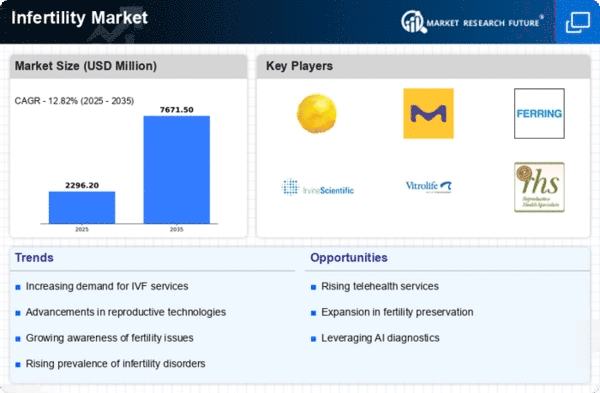Market Share
Infertility Market Share Analysis
The Infertility Market is witnessing dynamic strategies for market share positioning as it addresses a crucial element of reproductive health. With an emphasis on offering solutions to couples having trouble conceiving, businesses in this industry deliberately navigate the competitive landscape to increase their market position. Businesses are aggressively entering new international markets. This entails setting up fertility facilities, forming alliances with medical professionals, and guaranteeing that infertility treatments are accessible in various areas. The different needs of couples looking for reproductive treatments around the world are met by global expansion. Businesses are concentrating on tailored medicine since they understand how different every infertility issue is. More efficient and patient-centered reproductive treatments are made possible by customized treatment programs based on genetic variables, lifestyle factors, and unique patient profiles. Innovation is essential, especially when it comes to preserving fertility. Businesses are spending money on research to advance sperm and egg-freezing technology, giving people the choice to freeze their fertility for future family planning. Businesses are funding patient and healthcare professional education programs. Raising knowledge about the reasons for infertility, accessible therapies, and the emotional aspects of fertility journeys is facilitated by educational campaigns, counseling services, and training programs. Embracing the digital transformation, companies are integrating fertility services with telehealth options. Remote consultations, virtual monitoring, and telemedicine platforms increase accessibility and convenience in fertility care, especially for patients in remote areas. Companies are incorporating sustainability features into their infertility treatment programs. This includes eco-friendly clinic practices, responsible waste management, and efforts to reduce the environmental impact of fertility treatment procedures. Companies that recognize the impact of male factors in infertility are creating solutions that center on the reproductive health of men. This covers developments in male fertility therapies, sperm analysis, and the treatment of disorders that impact male fertility. Innovations in reproductive health are the subject of ongoing research. Businesses are spending money on research to investigate cutting-edge technology like artificial intelligence for predicting fertility, improvements in embryo selection, and creative methods to increase the success rates of infertility treatments. Businesses are looking into integrating their services with genetic counseling. Giving couples undergoing assisted reproductive procedures thorough genetic information on potential dangers and conditions related to fertility treatments helps them make educated decisions.


















Leave a Comment